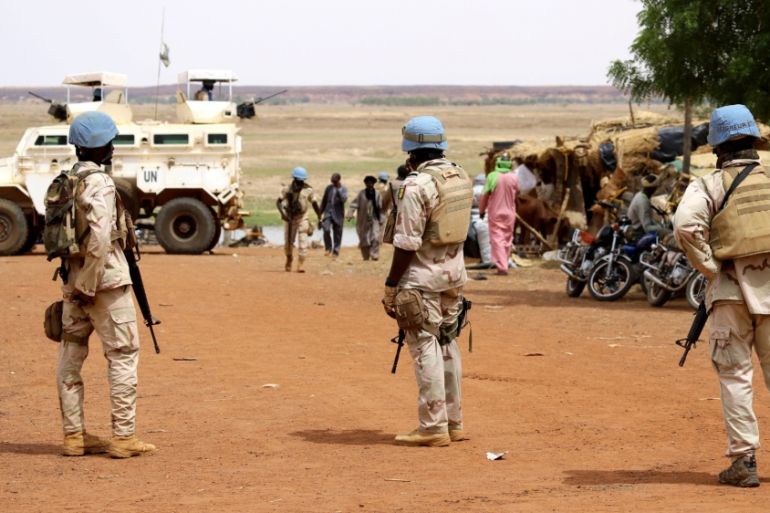UN renews Mali peacekeeping force MINUSMA without personnel cuts
Move allows for the number of troops to continue to comprise up to 13,289 soldiers and 1,920 police officers.

The United Nations Security Council has unanimously voted to extend the mandate of its seven-year peacekeeping force in Mali for another 12 months without any cuts in personnel.
Monday’s renewal of the mission, known as MINUSMA, allows for the number of its members to continue to comprise up to 13,289 soldiers and 1,920 police officers.
Keep reading
list of 4 itemsUS blocks Palestinian push for full UN membership at Security Council
Why is Germany maintaining economic ties with China?
UN’s Libya envoy resigns citing no hope for political progress
The expected move signifies a temporary truce between the United States and France, both permanent Security Council members and veto-power holders, according to analysts.
For more than a year, the US – the UN’s biggest financial contributor – has regularly questioned the mission, which costs $1.2bn annually, deeming it ill-suited to the continuing violence in the West African nation.
Meanwhile, France, which has taken the most active military role of any foreign power in its former colony, sees MINUSMA as an essential component of a broad coalition of forces currently attempting to root out armed groups.
Mali is struggling to contain a multilayered and complex conflict that erupted in 2012 and which has killed thousands of military and civilian since.
Despite the presence of thousands of French and UN troops, the violence has engulfed the centre of the country and spread to neighbouring Burkina Faso and Niger. Attacks have grown fivefold between 2016 and 2020, with 4,000 people killed in 2019, up from about 770 killed in 2016, according to the UN.
Meanwhile, the number of people forced to leave their homes due to the rapidly deteriorating security situation in the region has surged from about 600,000 internally displaced people recorded in May 2010 to 1.5 million by April 2020.
Earlier this month, UN Secretary-General Antonio Guterres said the mission “remains crucial”.
The renewal does commit to presenting a “possible exit strategy” for the mission by March 2021.
|
|
Analysts said MINUSMA, often dubbed the UN’s most “dangerous mission”, faces myriad challenges: a volatile environment that often proves deadly for UN forces, restricts peace-building initiatives and keeps the mission on a defensive footing; an inconsistent Malian ruling class; and a shifting and complicated crisis that has exploded in the centre of the country that lacks an adequate framework for resolution.
Despite such obstacles, Security Council members have not yet been able to deny that the mission is a necessity, according to Paul Melly, a consulting fellow at Chatham House’s Africa Programme.
“However difficult the track record, however troubling the situation, however slow the pace of progress – where there is any, when the Security Council is confronted with the actual reality of the situation on the ground, they come to the conclusion that there is no alternative,” he told Al Jazeera.
“MINUSMA needs to be there.”
Launched in 2013, MINUSMA’s strategic priority first focused on Mali’s north, a flat and unforgiving desert and semi-desert area. Its mandate included protecting civilians, aiding in implementing a 2015 peace agreement between the government and some separatist groups in the north, helping to re-establish the state authority and building the security sector, which was and continues to be largely absent in some regions.
The mission is also charged with monitoring human rights abuses by armed groups and the array of security forces operating in the country, a tenuous role, at times, since MINUSMA works in cooperation with many of those forces.
In 2018, the mission began to shift focus to Mali’s hot, semi-arid centre as the situation there began to devolve drastically. A year later, MINUSMA added a second strategic priority that includes helping the Malian government restore stability in central Mali, while also protecting civilians, helping to restore the presence of the state and promoting political peace initiatives.
The mission has become “life support” for a Malian state teetering on the edge, providing critical infrastructure, in particular air transportation, for a government that has largely retreated from large swaths of the country, said Judd Devermont, director of the Africa Program at the Center for Strategic and International Studies.
“I think that without MINUSMA, for as dire and desperate as the situation in Mali is, it would slide even further down into instability, unrest and un-governability,” he said.
“The most generous thing we can say about MINUSMA is that it slows Mali’s slide … But Mali continues to devolve and worsen despite MINUSMA’s presence.”